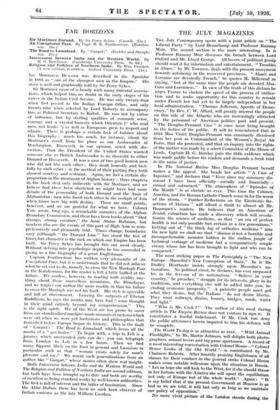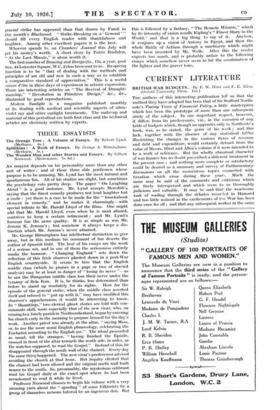THE JULY MAGAZINES
THE July Contemporary opens with a joint article on "The Liberal Party" by Lord Beauchamp and Professor Ramsay Muir. The second section is the more interesting. In it Professor Ramsay Muir discusses the breach between Lord Oxford and Mr. Lloyd George. All lovers of political gossip should read it for information and entertainment. "Troubles in Alsace," by Mr. Townroe, deals with the present movement towards autonomy in the recovered provinces. "Alsace and Lorraine are devotedly French," he quotes M. Millerand as saying, "but at the same time the people are devoted Alsa- tians and Lorrainers." In view of the truth of this dictum he urges France to slacken the speed of the process of unifica- tion and to make opportunity for this country to remain under French law but yet to be largely independent in her local administration. "Thomas Jefferson, Apostle of Demo- cracy," by Rev. C. W. Alford, will greatly interest the people on this side of the Atlantic who are increasingly attracted by the personnel of American politics past and present. "The Douglas-Pennant Case" is once more being brought to the notice of the public. It will be remembered that in 1918 Miss Violet Douglas-Pennant was summarily dismissed from her post as Commandant of the Women's Royal Air Force, that she protested, and that an inquiry into the rights of the matter was made by a select Committee of the House of Lords. Captain H. G. Barclay puts the little evidence which was made public before his readers and demands a fresh trial in the name of justice.
In The National Review Miss Douglas Pennant herself makes a like appeal. She heads her article "A Case of Injustice," and declares that "Ever since my summary dis- missal I have been officially—socially and financially— ruined and ostracized." The atmosphere of "Episodes of the Month" is as electric as ever. This time the Cabinet, America, and the Roman Catholic Church come in for the worst of the storm. "Further Reflections on the Electronic Re- actions of Abrams" will afford a thrill to almost all Mr. Bosanquet's readers. He believes that an American of Jewish extraction has made a discovery which will revolu- tionize the science of medicine, so that "an era of perfect health is not only possible but certain in a few generations." Getting out of "the thick fog of orthodox medicine" into the new light we shall see that "disease is not a horrible and incomprehensible monster hidden in the endless jungle of technical verbiage of medicine but a comparatively simple enemy whose lair has been brought to light and who can be conquered."
The most striking paper in The Fortnightly is "The New Europe—Mussolini's New Conception of State." In it Mr. Dudley Heatheote insists strongly upon Mussolini's na- tionalism. No political creed, he declares, has ever surpassed his in the fervour of its nationalism. "Believe in your country," he preaches, "struggle for its interests, glory in its traditions, and everything else will be added unto you, in- cluding economic prosperity." A patriotic people must get what they desire, but the Italians "do not desire liberty. They want railways, drains, houses, bridges, roads, water and light."
"Who is Mr. Cook ? " The author of this most daring article in The Empire Review does not venture to sign it. It constitutes a fearful indictment. If Mr. Cook can deny the public utterances herein imputed to him his defence will be complete.
The World To-day is as attractive as ever. "Wild Animal Flashlights," by Mr. Martin Johnson, will delight both photo- graphers, animal lovers and big game sportsmen. A record of a most interesting conversation with Colonel House—" Colonel House Looks at the Old World "—is contributed by Mr. Chalmers Roberts. After heartily praising Englishmen of all classes for their conduct in the general strike Colonel House makes some notable rellexions upon the situation in Russia. "Let us hope she will look to the West, for if she should throw in her fortune with the Asiatics she will upset the equilibrium not only of Europe but of the whole world." Again : "It is my belief that if the present Government at Moscow is as bad as we are told, it will last only as long as we maintain our policy of opposition." • No more vivid picture of the London streets during the
general strike has appeared than that drawn by Fundi in this month's Blackwood. "Strike-Breaking on a 4 General ' " should fill every English reader with thankfulness and laughter. Among other excellent papers it is the best.
Whoever spends is. on Chambers' Journal this July will get his money's worth. A short story by Patric Rushden, At the Last Minute," is alone worth it.
The first number of Drawing and Design (Is., 15s. a year, post free, 44 Leioester Square, W.C. 2) has been sent to us. Its special function is to be "that of dealing with the methods and principles of art old and new in such a way as to establish a comparative standard of appreciation." This is a useful raison d'Ure in these days of experiment in artistic expression. There are interesting articles on "The Revival of Draught- manship," "Devolution in Primitive Design," &c., &c., illustrated by good reproductions.
Modern Sunlight is a magazine published monthly at 2s. dealing with medical and scientific aspects of ultra- violet ray and other sunlight treatments. The make-up and material of this periodical are both first class and the technical articles are obviously written by experts.











































 Previous page
Previous page